
A Catalyst for Local Good
The Economic and Social Impact of the University of the District of Columbia
Overview UDC’s Impact on the Local Economy
Through its daily operations, capital investments, student and visitor spending it attracts, and the wage premium its alumni can command, UDC has a significant impact on the local economy. In aggregate, UDC generates an annual economic impact of nearly $400 million within Washington, DC, supporting about 2,770 jobs and $185 million in employee compensation. In addition, UDC generates nearly $26 million in tax revenue for the DC government.
-
#1 Best Affordable Bachelor’s Degree in DC
-
#6 Clinical Law Program in the Nation
-
Enrolls more DC High School graduates than any other university
Source: USNews, AffordableSchools (2022)
About UDC
Established in 1851 as the Miner School for Colored Girls, the University of the District of Columbia (UDC) has grown in stature and prominence over the decades. Today the institution has approximately 4,500 students and offers over 80 undergraduate and graduate degree programs through their community college and flagship campus. At the heart of UDC mission is to educate and credential students to become lifelong learners and transformative urban leaders in the community. In addition, UDC boasts significant workforce development programs used to reskill and upskill Washington, D.C. (DC) residents to help meet the workforce demand. UDC is the only public, emerging research, university in DC and the only exclusively urban land grant university in the nation. As such, UDC plays a significant role in supporting the vitality of DC and the region.
Mission
Embracing its essence as a public historically black urban-focused land- grant university in the nation’s capital, UDC is dedicated to serving the needs of the community of the District of Columbia, and producing lifelong learners who are transformative leaders in the workforce, government, nonprofit sectors, and beyond.

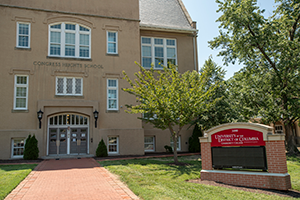 Not only is UDC an economic engine, but the university is producing positive, catalytic benefits for Washington DC and the region. Its efforts are guided by The Equity Imperative, a forward-looking strategic plan, that prioritizes key goals such as 1) delivering accessible affordable quality education, 2) providing workforce development and business support, 3) serving community needs, and 4) advancing groundbreaking urban research.
Not only is UDC an economic engine, but the university is producing positive, catalytic benefits for Washington DC and the region. Its efforts are guided by The Equity Imperative, a forward-looking strategic plan, that prioritizes key goals such as 1) delivering accessible affordable quality education, 2) providing workforce development and business support, 3) serving community needs, and 4) advancing groundbreaking urban research.
UDC provides opportunities for students to experience the campus early, exposing them to STEM career pathways, and cultivating a generation of students that is more prepared for higher education. UDC also prides itself on offering programs that reach traditionally under-served and financially disadvantaged populations. As a result, UDC is creating a more equitable educational community in DC.
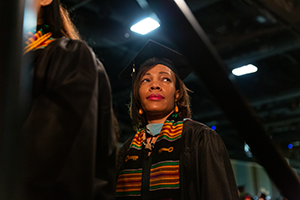 Notably, for every dollar that the DC government invest in UDC, it is receiving $4 back in economic impact to the local economy. Yet, the real ROI is the long-term benefits to the students, local community, and society at large. By investing in the sole public HBCU, the DC government is enabling affordable quality education for thousands of students a year who contribute to the workforce (and serve faithfully) in their host communities. Moreover, through investment in the University, the DC government is providing individuals and their families with additional pathways to the middle class.
Notably, for every dollar that the DC government invest in UDC, it is receiving $4 back in economic impact to the local economy. Yet, the real ROI is the long-term benefits to the students, local community, and society at large. By investing in the sole public HBCU, the DC government is enabling affordable quality education for thousands of students a year who contribute to the workforce (and serve faithfully) in their host communities. Moreover, through investment in the University, the DC government is providing individuals and their families with additional pathways to the middle class.
As UDC fully implements the Equity Imperative, it will grow in its footprint, operations, research prominence, and economic impact – all while meeting the current and future needs of residents. Thus, UDC plays a catalytic role in enriching DC, strengthening the region, and advancing equitable outcomes in society.
UDC Programs Benefit Our Community
- Through its workforce development and entrepreneurship programs, UDC is the best investment to reskill and upskill the DC workforce.
- UDC is a force for good in the local community through its volunteer and service-learning programs.
- As the nation’s only exclusively urban land-grant university, UDC is at the forefront of advancements in research topics important to DC such as urban agriculture, food production, and green infrastructure.
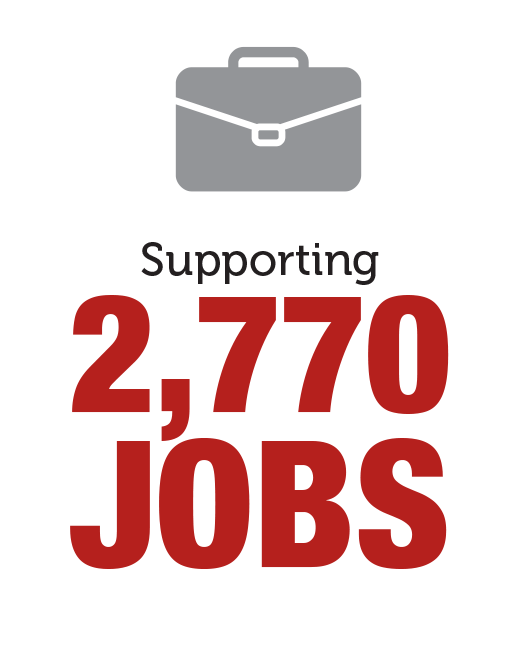
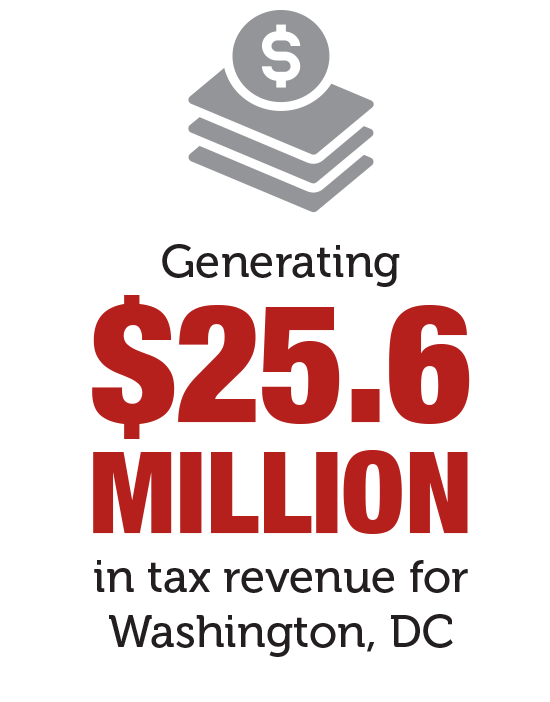
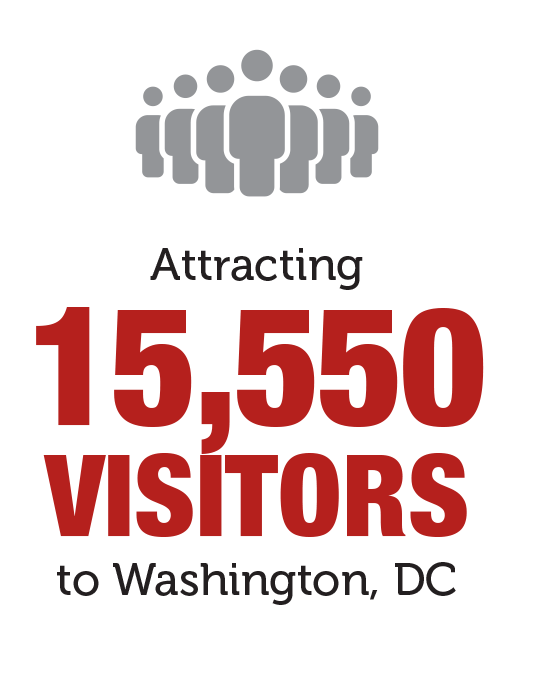
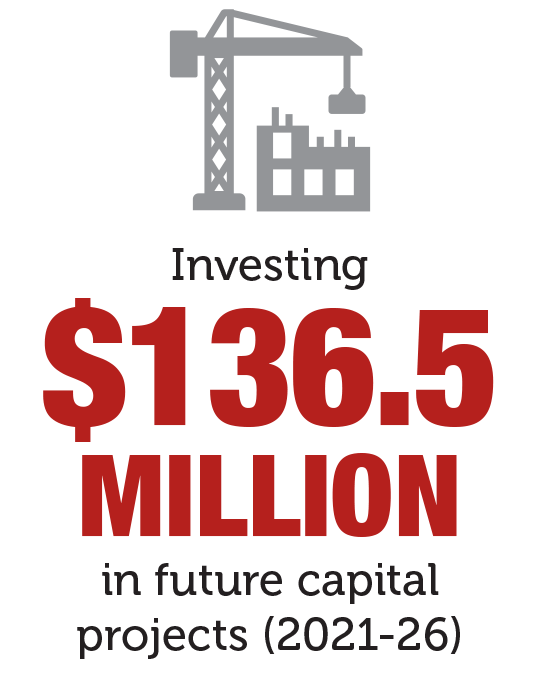
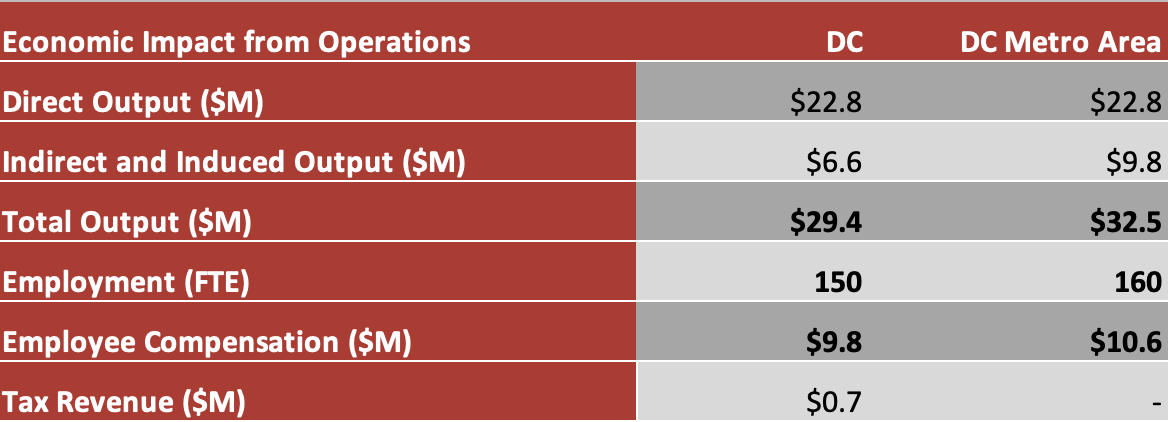
Impact from Operations
University of the District of Columbia’s annual operations supports the University’s continuing mission of cultivating the next generation of leaders through scholarship, research, and service. They are also an economic driver for the city and region. UDC currently has an annual budget of $170 million; it directly employs over 1,400 people. In addition to being an anchor institution, UDC is a major purchaser of goods and services across a range of categories. This direct economic footprint has spillover impacts on suppliers and workers across a range of sectors.
In the aggregate, the economic impact of UDC’s operations on Washington, DC is $189 million per year, supporting 1,530 full-time equivalent jobs and its total economic impact, directly and indirectly, generates over $7 million in DC tax revenues.
Impact from Capital Investments
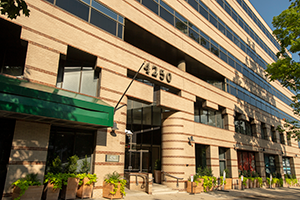 Capital investments made by the University of the District of Columbia represent a significant number of construction projects, which supports jobs, create demand for various goods and services, and generate citywide tax revenues. These investments stimulate additional business activity and create a more vibrant community for UDC students, staff, and local residents. As UDC continues to expand, improved investments in facilities including state-of-the-art labs, classrooms, and other academic facilities will support economic activity throughout the city and region.
Capital investments made by the University of the District of Columbia represent a significant number of construction projects, which supports jobs, create demand for various goods and services, and generate citywide tax revenues. These investments stimulate additional business activity and create a more vibrant community for UDC students, staff, and local residents. As UDC continues to expand, improved investments in facilities including state-of-the-art labs, classrooms, and other academic facilities will support economic activity throughout the city and region.
In the aggregate, the annual economic impact from UDC’s capital investments within Washington, DC is about $30 million per year, supporting 150 full-time equivalent jobs and generating about $700,000 in DC tax revenues.
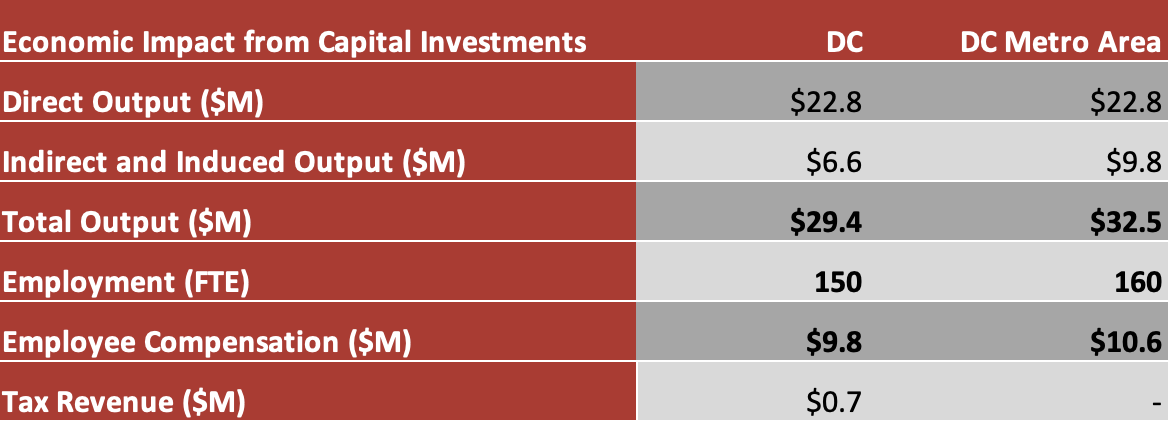
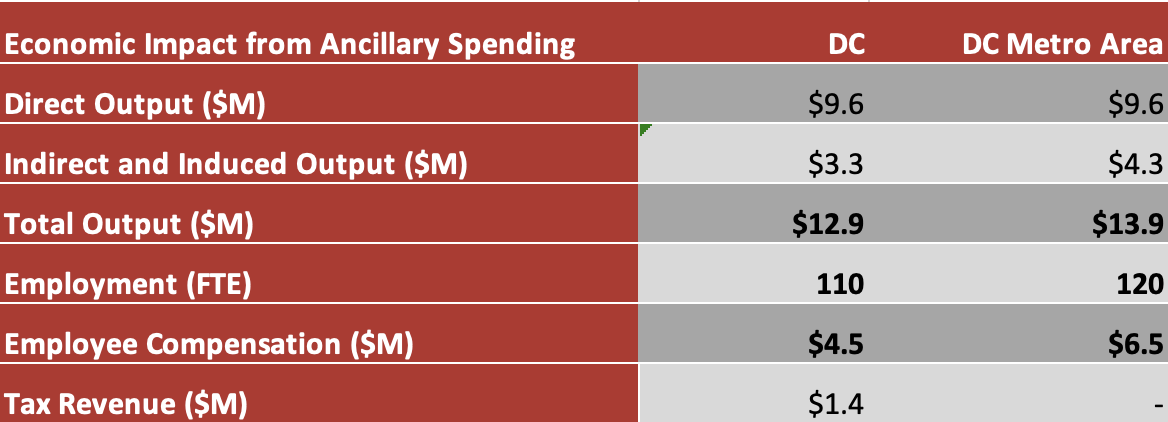
Impact from Ancillary Spending
Over and above its own spending on operating activities and capital investments, UDC draws out-of-town spending from students and visitors that would likely not occur without its presence in Washington, DC. Of the two ancillary spending types, students by far represent the largest category, due to their volume and time spent in the city. Student spending on retail, transportation, and housing generates new spending into DC.
In addition to students, there are a significant number of visitors to UDC each year, which also brings spending into the region. These visitors come to DC and UDC in particular for a variety of reasons, including conferences, special events, and commencement. When they visit, they spend money in the local economy on retail, food & beverage, lodging, and transportation. Their spending can be considered new to DC.
Furthermore, both students and visitors create demand for restaurants, retail establishments, hotels, and entertainment venues. As such, their expenditures in the area generate economic impact for the DC economy.
In the aggregate, it is estimated that this ancillary spending is responsible for nearly $13 million in economic impact within Washington, DC, supporting 110 jobs and generating $1.4 million in DC tax revenues.
Impact from Wage Premium
 The link between educational attainment and earnings power is well-established, and a wage premium associated with additional education is often conceptualized and calculated from the perspective of the student, who can compare the costs associated with various educational (or non-educational) options with the expected return.
The link between educational attainment and earnings power is well-established, and a wage premium associated with additional education is often conceptualized and calculated from the perspective of the student, who can compare the costs associated with various educational (or non-educational) options with the expected return.
This analysis utilizes this framework to estimate the gain not to the student, but rather to the city and regional economies. Additional earnings attributable to UDC within these geographies are estimated and translated into additional spending power within the local economy, which supports local employment and earnings. It is estimated that the wage premium conferred on UDC alumni produces $174.5 million in economic impact each year within the Washington, DC economy and generates $17.3 million in tax revenues for the DC government.
In addition to the immediate impact of the increased spending power, the educated workforce has important long-term implications due to the effect UDC has on students’ career trajectory. UDC contributes to the strength and diversity of the economy by educating and credentialing students.
